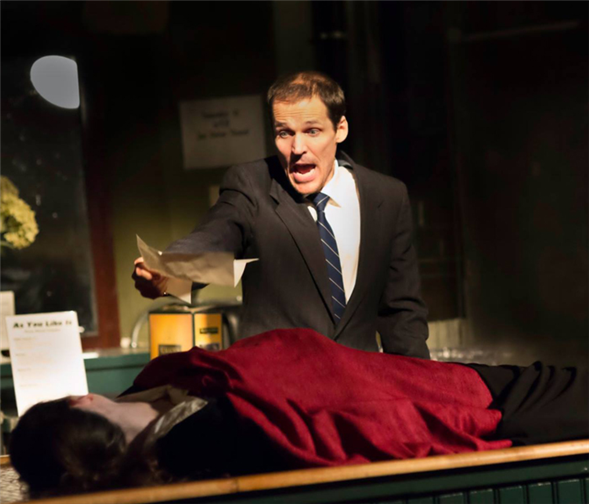Translate Page

The 1599 Project presents the Bard's best year
---
1599 was an incredibly fertile year for William Shakespeare. In the time it takes many people to finish a kitchen renovation, he churned out four of the greatest plays in the Western canon: Henry V, Julius Caesar, As You Like It, and, oh yes, Hamlet.
This month in Brooklyn, Irondale Ensemble celebrates that productivity with the 1599 Project, an epic evening of performance that includes all four shows. Directed by Irondale artistic director Jim Niesen, the event clocks in at four and a half hour and moves the audience to four different locations within the Irondale building. The theme even holds during intermission, when patrons are served a vegetarian picnic that includes (ahem) Julius Caesar Salad.
The project took shape after Niesen read Jim Shapiro's book about Shakespeare's big year. He realized that instead of producing the four plays separately, he wanted to focus on their collective achievement. "Putting on all the plays in one evening is not an intellectual exercise, because you go on an emotional journey," he says. "By the end of the evening audiences are ready to invite the actors to Christmas dinner!" (They may indeed need the calories: There are only six performers to play 87 roles.)
Here's a snapshot of how each play will be presented:
• Niesen calls Henry V an "improbable adventure story" and describes what almost sounds like a buddy comedy. The titular character hasn't measured up to his status as a noble son, but soon enough he starts inspiring troupes and beating French soldiers. The first show of the evening, Niesen stages it on half of Irondale's main floor, giving a sense of spectacle to the proceedings.• Next comes Julius Caesar, which Niesen likens to America's current political culture. "You see so much of Obama in this," he says. "You have this strong leader who is so appealing, but what happens to the person who tries to overtake that leader? Brutus is an idealist, and we see him struggle with his own power." During political machinations, Niesen leads his audience to Irondale's half balcony. "It helps with the conniving and paranoia," he says, adding that additional scenes unfold in a series of small rooms.
• As You Like It may seem like the odd play out in this group, but Niesen enthuses that it encapsulates how Shakespeare invented the musical comedy: "There's all kind of musical interludes in it!" Though it begins as a banishment play, with Rosalind exiled to the forest, it soon becomes a type of swashbuckling romance. "In the forest Rosalind falls in love with Orlando and recharges her batteries," Niesen says. For this show, the audience returns downstairs – to the other half of the main space – where pillows, carpets, and swaths of fabric add to the relaxed milieu.
• Rosalind ends her play by returning to a happy court, which is incidentally where Hamlet begins. Except, oh wait: the court has been overtaken by Hamlet's murderous uncle, which prompts his nervous breakdown. "It's like he goes to a rest home, but then they send him right back into the same situation that caused him to go crazy in the first place," Niesen says. For this revenge tragedy, Niesen puts onlookers around a table in a contained and claustrophobic space. "The audience feels they are sealed into a big tent" he adds. Are we complicit in Hamlet's undoing? It's a question worth mulling as you enjoy the evening's final touch – "Shakespeare's Favorite Dessert," a rustic oatmeal raisin cookie.---
TDF Members: At press time, discount tickets were available for 1599. Go here to browse our latest offers.
Eliza Bent frequently writes about Brooklyn theatre for TDF Stages.
Photos by Nat Nichols. To photo: A scene from 'Julius Caesar' in '1599.'